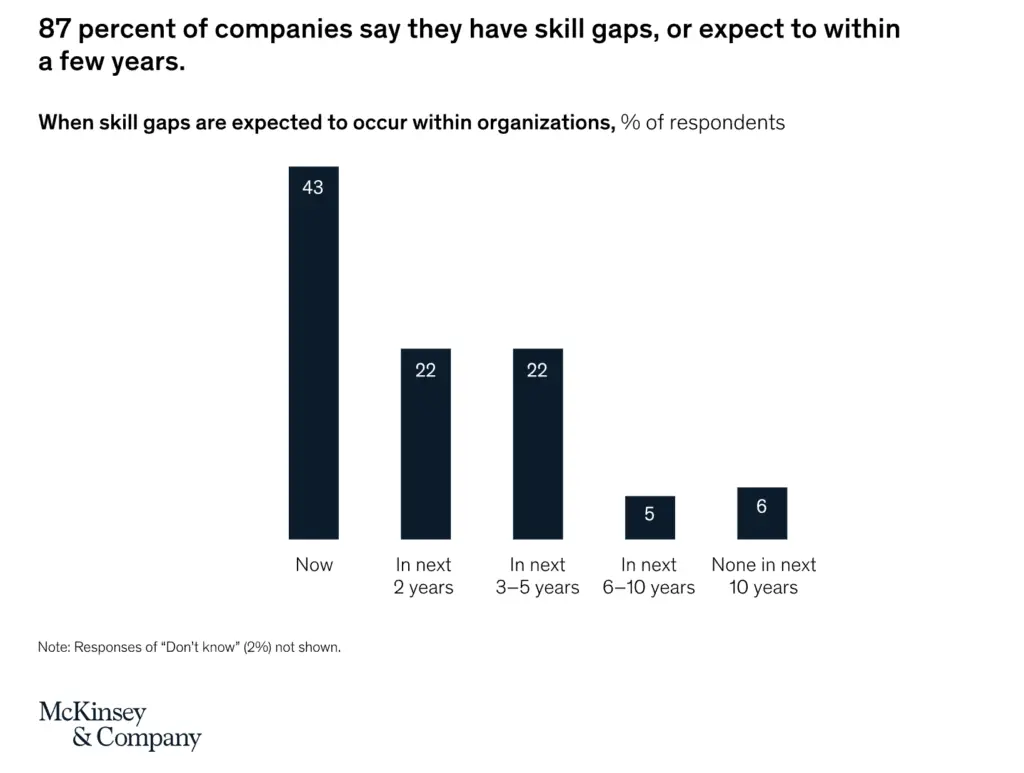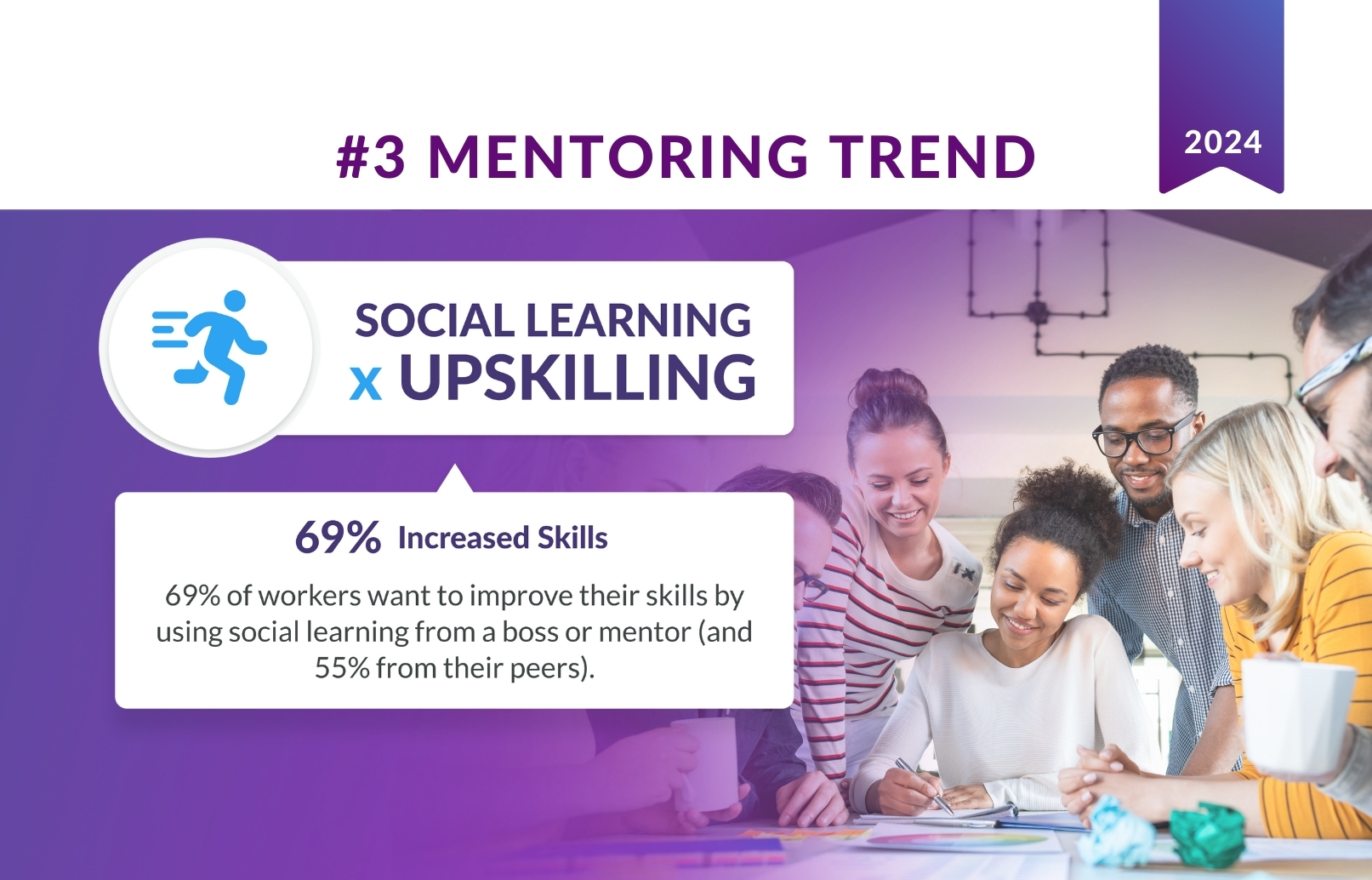A dramatic cultural shift in the workplace happened in 2020, which companies are still dealing with today. The global pandemic caused what researchers have called “Pandemic Epiphanies.” People examined where they are now and, collectively, decided it wasn’t good enough.
The result?
- A surge in turnover, earmarked in history as “The Great Resignation”
- A significant drop in productivity and engagement, now called “The Great Gloom“
A third of U.S. workers chased higher salaries during The Great Resignation by switching jobs, only to realize that simply earning more money didn’t spark the joy they’d hoped. For many, two key underlying needs remain unaddressed:
- A desire to develop deeper and more personal connections at work
- A desire to grow and develop their skills
In 2024, organizations will begin to see a creative path forward for themselves and their employees by ramping up social learning engagements through mentoring. This strategy will provide workers with the skill development they need and the deeper workplace connections they want. By leveraging the strength of their institutional knowledge networks, companies will be able to solve two of their most pressing employee engagement issues using a single solution.
What’s more, this strategy will help companies break down longstanding knowledge silos between departments and functions, opening up opportunities to advance and improve company culture and career development in an incredibly organic way.
Why Do Companies Need to Help Employees Upskill through Social Learning?
Employers worldwide have been staring down an emerging skills gap for years. The issue isn’t just a lack of increasingly difficult-to-find hard skills. There’s also a soft skills crisis that’s only accelerated in our remote work era and exemplified by digital natives like Gen Z.
In a CNBC report, Tara Salinas, a professor of business ethics at the University of San Diego, explained that:
“Gen Z are digital natives and they’ve always communicated online, so their interpersonal skills, or soft skills, have suffered.”
This is not an attack on Gen Z workers or workers of any generation.
However, it does help expand the scope of the problem. Work has become more complex, and workers need to be far more agile than they were in the past. According to Korn Ferry, the skills gap is growing, and by 2030, it will cost businesses a collective $8.5 trillion in lost productivity.
At a micro level, companies that can figure out how to simultaneously improve their skill development landscape and their company culture stand to benefit the most. LinkedIn found that 94% of people would stay longer if their company offered skill development and learning opportunities. And Nectar found that nearly 70% of workers would be happier if they had deeper connections to their colleagues.
Employee retention and happiness at work positively influence employee productivity and company profitability. Companies that give employees both within a unified solution stand to gain the most ground and will even begin to reverse current employee trends like The Great Gloom.
Is the Need for Social Learning and Upskilling Universal?

McKinsey found that 87% of companies know they have a skills gap either right now, or that they will have one within the next 3-5 years. Only 6% of companies don’t believe they won’t have a skills gap any time in the near future.
By and large, the need for employee upskilling or reskilling has hit almost every company in every industry in every part of the world.
The striking part is in how many companies thought they had solved the problem. Between 80% and 89% of employers say they offer development opportunities, yet only 61% of employees say development is available at their workplace.
When you dig even further, you’ll find that there are huge gaps in who participates in development that should raise alarm bells for every company.
According to a DeVry study, just 51% of employees say they take advantage of company-paid upskilling opportunities. The numbers are even worse for women and individuals from historically underrepresented groups, where just 37% and 42% have taken advantage of these benefits, respectively.
Overall, 33% of employees believe their company isn’t fulfilling its duty to upskill and reskill them.
Those are damning numbers that likely speak to an uncomfortable truth: Employers are offering skill development opportunities that don’t work and aren’t accessible in the way employees need most. These development strategies are also misaligned with their desired learning styles.
Employees Default to Social Learning When They Need to Learn New Skills
Mismatched approaches are behind the vast disconnect between the types of development employers provide, and the types of development employees want to see. Traditional learning and development strategies are often built around how students learned when they were in school. However, this is how most adult learners want to grow their skills in the workplace.
Degreed found that when workers want to learn something:
- 69% ask a boss or mentor
- 55% ask their peers inside the company
- Only 27% use their employer’s LMS
- Only 21% rely on their company’s L&D or HR department for resources
The traditional way of developing employee skills relies on self-directed courses, classroom-style learning, and one-off training sessions. However, this is not most people’s preferred way of gaining skills in the workplace. After all, most adults thought (hoped) that they kissed this learning style goodbye after graduating.

When employees want to learn, they naturally gravitate to social learning styles by leaning on the humans around them who they believe have the knowledge they want to acquire. This not only allows them to get direct person-to-person engagement that develops their relationship with their colleagues, but it also gives them meaningful development that’s highly targeted to their needs.
Instead of having to sift through hours of learning material, employees can pinpoint the exact questions they need to ask to help move their development forward. However, existing silos within companies will limit employee’s visibility in who they can ask for help, reducing the overall impact of this approach.
Conversely, formalized, structured social learning programs dynamically pair mentors and mentees together based on their personality, interests, and development needs. This approach easily reaches across functional siloes, making social learning and upskilling far easier to achieve. Additionally, when companies leverage software, people can self-select from a database of colleagues whose skills and experiences match what they want to learn, irrespective of function.
Red Hat Reaped the Benefit of a Silo-Busting Open Mentoring Program
In 2018, Red Hat came to MentorcliQ to help standardize existing mentoring initiatives and make its programs more inclusive and accessible to everyone in the organization.
The company initially started with an open career development pilot program for leadership but soon rolled out to the entire organization as it received several word-of-mouth requests from people wanting to participate.
A people-centric design
Red Hat now supports over 12 active mentoring programs across career development, DEI, and functional skills development. The company structured its mentoring program to run in 6-month cycles and match people across functions, regions, and job grades to support diversity in experiences.
People were also matched based on the competencies they wanted to develop, such as influence, communication methods, and effective execution. Red Hat utilized MentorcliQ’s SMART match feature to remove bias and perception of bias in the matching process. This helped them align with their culture of inclusivity.
Results
Red Hat enjoyed the fruit of its thoughtful labors across multiple areas, including retention, employee development, program satisfaction, and program ROI.

- After expanding its mentoring program beyond the pilot, the company experienced a 63% decrease in employee turnover among program participants. This equates to a 96% retention rate for this group.
- After parsing its program data, the company discovered that 40% of its program participants had some type of intra-company job movement. Amazingly, 60% of those movements were promotions. The promotion rate for participants was 2x that of the non-participants within the company.
- Red Hat examined its program and relationship satisfaction, revealing a 92% satisfaction rating among mentors and mentees.
- Red Hat followed a cohort of mentoring program participants for just over 28 months to gather data on ROI. The result? A retention benefit of $6,000,000 with a 107x ROI compared to the cost of creating and operating its mentoring programs.
Red Hat’s results speak specifically to how social learning and upskilling work in tandem. Employees who engage in mentoring relationships that matter to them and learn directly from internal experts grow personally and professionally. This helps maintain and expand company culture and boost productivity, even within companies like Red Hat that continue to champion remote and hybrid work flexibility.
Take it with you:
Download the full Red Hat case study
Your People Are Your Skills Gap Closers
There’s a saying in sales: “Coffee is for closers.” This means that only people who close deals get to enjoy those luxurious coffee breaks. For everyone else? Get back to work.
HR and Talent Development leaders have for too long felt they don’t deserve that coffee break until they close the skills gap. It doesn’t help when executive leaders and boards are also critiquing the numbers and asking for more results.
Yet one of the easiest, most cost-effective, and most organic ways to close that gap is to leverage the people you have right now. Mentoring programs can help you:
- Identify who has the skills you’re targeting
- Match them with individuals who need those skills,
- Measure the success of those engagements over time.
Not only does this allow people to learn in the way they’d most prefer (remember, people tend to turn to other people first for learning), but it also reduces the lift and stress burdening HR and Talent Development leaders.
Social learning through mentoring is far easier to start than you could imagine. Dig more into mentoring software’s features, and when you’re ready…




